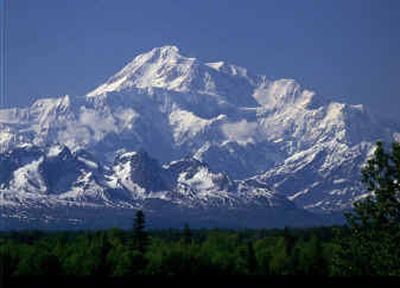About half of climbers reach McKinley’s top

ANCHORAGE, Alaska – The climbing season on Mount McKinley is winding down for the year after more than 1,200 mountain climbers tackled North America’s highest peak and about half of those reached the summit.
During the height of the season in May and June, the base camp on Kahiltna Glacier – at 7,200 feet above sea level – was home to hundreds of climbers, park rangers, air taxi operators and tourists.
However, the ranger station on the glacier has been shut down now for the year and the temporary air-traffic-control station has been removed.
“Everything is off,” chief mountaineering ranger Roger Robinson said.
Seventy-eight climbers remain on the mountain, said Pam Robinson at the Talkeetna ranger station for Denali National Park, but they are a comparative handful stretched over the 16 1/2 miles of trail along glaciers and rock ridges reaching toward the 20,320-foot summit.
At the peak of the season, climbers along that route numbered in the hundreds.
Communities of multicolored tents blossomed around established campsites where mountaineers congregated at 7,800, 9,500, 11,000, 14,200 and 17,200 feet.
As of Friday, Pam Robinson reported that 1,197 mountaineers had been on and off the mountain, with about 630 reaching the summit.
That’s about an average success rate.
The climbing season was marred by the first fatality in two years.
Three descending climbers were hit by falling rocks near the 13,200-foot level in late June.
Clint West, a 47-year-old American living in the United Kingdom, was killed. Mark Morford, 47, of Portland, and Gerd Islei, 56, of Germany, were injured.
Morford’s right thigh and a wrist were broken. Islei suffered broken ribs, a collapsed lung and a ruptured disc in his back.
They were flown off the mountain to an Anchorage hospital and are expected to recover fully.
Several other rescue missions on Mount McKinley during the climbing season ended much the same way. “It’s just how the luck goes,” Roger Robinson said.
For the first time, nearly all climbers carried along a clean-mountain can to pack out their human waste.
Comments from climbers were mostly favorable, Roger Robinson said.
Many concluded it was more comfortable to sit on the cushioned rim of the can than to squat in the snow.
“It’s working out well,” he said.
However, Roger Robinson said the cans are proving difficult to clean.
He’s looking for an improved model, hoping that what has been pioneered on Mount McKinley can be expanded to the increasingly waste-fouled mountains of the Himalayas and South America.
“If climbers can do this at high camp on McKinley, they can do it anywhere,” he said.